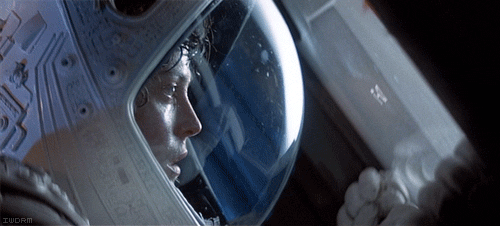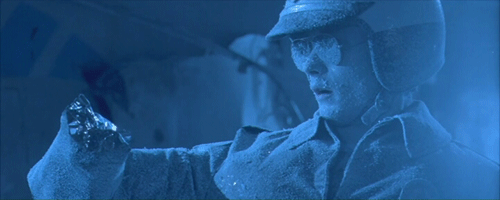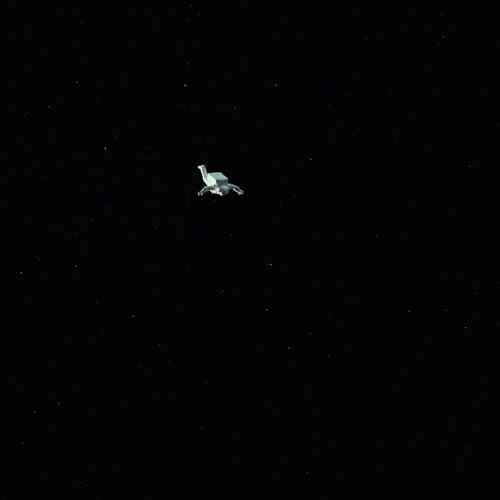Our Science Fiction Movies Hate Science Fiction
by Ryan Britt

Ripping off the heads of robots like a sweaty space-age cyberpunk Robin Hood, Matt Damon is delivering future-social-justice this week in Elysium. It’s directed by Neill Blomkamp, who brought us the politically charged alien flick District 9. Elysium as well has been positioned to be this summer’s antidote to stupid run-of-the-mill blockbuster science fiction films.
Like the alien apartheid in District 9, the division between “serious” science fiction films and “mainstream” SF flicks certainly exists. But the actual boundaries between these kinds of movies might be fairly blurred. What’s more, it’s not clear any more if these science fiction movies even like science fiction.
When I was nine years old, I received my first definition of science fiction from my late father, after he tricked me into renting Barbarella from the local video store. Dad insisted that real science fiction contained “spaceships and babes.” As in Robert Palmer’s then-popular “Addicted to Love” video, sexy women seemed to be the important part for him, and it’s here where we can form an inverse corollary for detecting serious science fiction films. We know what it’s not. This isn’t to say half-naked people can’t be present in a serious science fiction movie, it’s just that their presence alone doesn’t make it so. All squares are rectangles, but not all rectangles are squares.
The serious science fiction film derives its story and aesthetic from a concept that does not yet, as we know it, exist — aliens, robots, spaceships, time-travel — and the rest of the movie examines the repercussions of that science fiction idea. Serious science fiction (like Children of Men) has people or society at its center. And this may sound axiomatic, but the serious science fiction film takes its concept seriously. Often the proof of this serious devil is in the details. In Contact, Jodie Foster’s Ellie worries that everyone is okay with installing a chair into the nifty spacepod the aliens told us to build, even though the schematics said nothing about a chair. The real-world answer is “because it’s a movie,” but the fact that the script addresses the chair at all is part of what makes it a serious science fiction film. The chair also serves to introduce more doubt about whether the spacepod functions — but mostly, the movie actually wonders about how the science fiction would function in a real-life situation.
But my late father can have his spaceships and “babes” too. The original Star Trek: The Motion Picture (directed by Robert Wise of The Day the Earth Stood Still!) features a foxy bald alien named Ilia, but also has at its center a basic science fiction conceit, which the movie in turn, takes seriously: How would an artificially created creature of extreme intelligence and power cope with the idea that it was created by hopelessly flawed organic creatures? You might call this film slow, boring, or even worse; pretentious, but in almost every single way, it is the most serious science fiction film of any of the big screen Star Treks. This summer’s Star Trek Into Darkness, in comparison, is mostly people punching each other. A bunch of violence and horror don’t equal good SF, despite how many people get smacked.

Superficially, the story of Alien is mostly just an improbable monster trying desperately to kill everyone in a confined space. But no film has a more serious attitude towards its premise. It is bound by the construction of a realistic (and probable) world, and that world seems to have rules which can’t be broken. Independence Day, or The Avengers, or Oblivion are not like this. Shoot-’em-ups are often more entertaining viscerally than their more earnest cousins. But saying The Avengers is more “entertaining” than Elysium is like saying Internet porn is more fun than the Merriam-Webster “Ask the Editor” online video series. Everything has its place.
And while educational YouTube videos aren’t in direct competition with Internet porn, serious SF movies are constantly in the shadow of the big blockbuster versions. Quiet, small-stakes science fiction movies do exist, but for every Moon or Primer or Safety Not Guaranteed out there, there’s also an After Earth or Oblivion to drown it out with big stakes, loud music, monsters and guns (laser or otherwise). And the genre and the industry have their impact. To combat their cheesier compatriots, films like Elysium get burdened with epic stakes (and epic soundtracks). There’s a weirdly pervasive result of this imitation or cohabitation: despite being more thoughtful than other blockbusters, serious SF movies are often just as violent as their dumb cousins — and can be frighteningly anti-science.

While The Terminator films aren’t technically serious SF, they are emblematic of the general problem with an anti-technology knee-jerk tendency in nearly all Hollywood SF. (The third film is moronically subtitled “Rise of the Machines.”) This subtitle could be attached to nearly every major science fiction film ever: most big-league SF leans heavily on dystopia. (The Alien franchise, at its early best, is a reasonable pro-science capitalist-ruin dystopia; as the franchise proceeds and degrades, it turns against science as well.) If x future concept comes to exist, the writer’s room reasoning goes, then it follows that it will be misused, abused, or will otherwise be used to figure out a way to destroy us. If that science fiction thing is technology we’ve created, it will turn on us either because it becomes a murderous Terminator robot, or because the rich and powerful have used the technology to oppress everyone else. Technology is the bad guy in 2001, The Matrix, Gattaca, Logan’s Run, Avatar, Planet of the Apes (the original), Looper, 28 Days Later, Equilibrium, Jurassic Park, and, most bizarrely, last year’s Prometheus. At least 9 out 10 serious science fiction movies are dystopian narratives with characters struggling against their filmmaker’s SF inventions.
All stories need conflict, and big movies really need big conflict. No one wants to leave a SF movie thinking, “Wow that really was an accurate meditation on science fiction in a realistic setting.” But the vast majority of science fiction films — even the very best of them — still see the SF, the tech, the speculative concept, as the antagonist of the film. We had a regular movie here until this spacepod showed up, and now, it’s all going down!

But literary source material doesn’t have to be like that. (Nor does every movie. One rare exception: the rather crazy but also wonderful Nicolas Cage vehicle Knowing.) The original collection of Asimov’s linked stories — I, Robot — doesn’t explore the ways in which robots turn on humanity and screw up their lives. Instead, it’s about robot problems. The singularity actually happens towards the end of the book, and it’s a relatively positive thing. This isn’t to say those stories are without conflict; a short story about a well-meaning lying robot is a particular favorite of mine. It’s just that the conflict isn’t about punching people, nor is the science fiction itself seen as the conflict alone. This is why Ursula Le Guin novels don’t become movies.
Elysium could have been poised to change that simply by virtue of the fact Matt Damon is using an SF creation — a super-powered robot exoskeleton — to fight science fiction: a space station dream paradise which allows the rich to forget about the rest of us. This is a gorgeous set-up, but it’s all there is: then it becomes every Iron Man, two guys in super-powered suits hitting each other. There’s a character in Elysium named Kruger, who probably has more screen time than Jodie Foster and is the poster-child for a laughable cartoon bad guy. Whenever he kills someone, he issues his catcphrase: “That’s what I’m talking about!” He also reminds me of this guy in this “Give him the stick!” G.I. Joe Parody video.
Elysium uses the shiny aesthetics of golden-era science fiction as the oppressor of a more realistic Earth. Even the robots are chromed-up and straight from central casting: they talk like robots, they look like robots. They are the tools of “the man.” Matt Damon works in a construction plant which manufactures the robots, which is ham-handed for the message that technology keeps good people down.
The most unlikely science fiction film this summer to actually use technology, instead of just fight it, is Pacific Rim. Here, linking your brain with your brother, father, friend or girlfriend makes you a better person and allows you to control a giant robot which saves people’s lives. As silly as it sounds, Pacific Rim is a SF movie that actually likes science fiction. It doesn’t take itself too seriously — or, for that matter, make much sense — but it’s never cynical. And though it’s mostly action, the film is not violent in the horrific way Elysium is. Pacific Rim gets to have its alien lunch and smack it with robots too. Will Gravity, Alfonso Cuarón’s forthcoming Clooney-in-space thriller, free us after the summer’s simplification of SF? Space-suited fingers crossed!

I would prefer an abundance of senseless sex to the amount of endlessly uncreative violence in today’s big science fiction films — which is all of the films, really. With the exception of Titanic, the top-grossing fifty films are all SF or fantasy. The oldest of them are very, very different than the ones we have today. Yes, the endlessly ammunitioned Terminator existed, but there were also big films like E.T., Back to the Future, Starman, Enemy Mine, and Star Trek IV: The Voyage Home. None of these films are overtly violent — and neither do they take an anti-science or anti-science-fiction stance toward their subject matter.
For all the great special effects and enormous, booming noises our films are bringing us now, the majority of science fiction films have forgotten the one thing science fiction is supposed to do: make us think about the future. Thinking, we have forgotten, is not the same as worrying.

Ryan Britt is a fiction writer, essayist, and critic living in New York City. His work has appeared with Nerve.com, Good.com, Opium, Soon Quarterly and elsewhere. His science fiction/fantasy criticism has appeared with Clarkesworld Magazine, The Mindhut, and also extensively on Tor. He teaches at the Gotham Writers’ Workshop.
